
Thinking Ahead for the Legal Future
Tech-celerate for Law Conference Highlights
The Tech-celerate for Law conference was held on 15 May 2019 to commemorate the launch of the Law Society’s latest legal technology initiatives, the Tech-celerate for Law programme and the SmartLaw Guild. This article provides a summary of the conference proceedings.
Held at the Intercontinental Ballroom on 15 May 2019, the Tech-celerate for Law conference was a full-day event marking the launch of the Tech-celerate for Law programme on 2 May 2019. Like the highly successful Tech Start for Law programme which ended on 28 February 2018, the Tech-celerate for Law programme is a grant scheme to help Singapore law practices adopt and integrate technology into their practices, to augment the efficiency and quality of the legal services delivered and better handle future disruptions. The Tech-celerate for Law programme is administered by the Law Society of Singapore in partnership with the Ministry of Law, Enterprise Singapore, and the Info-Communications and Media Development Authority.
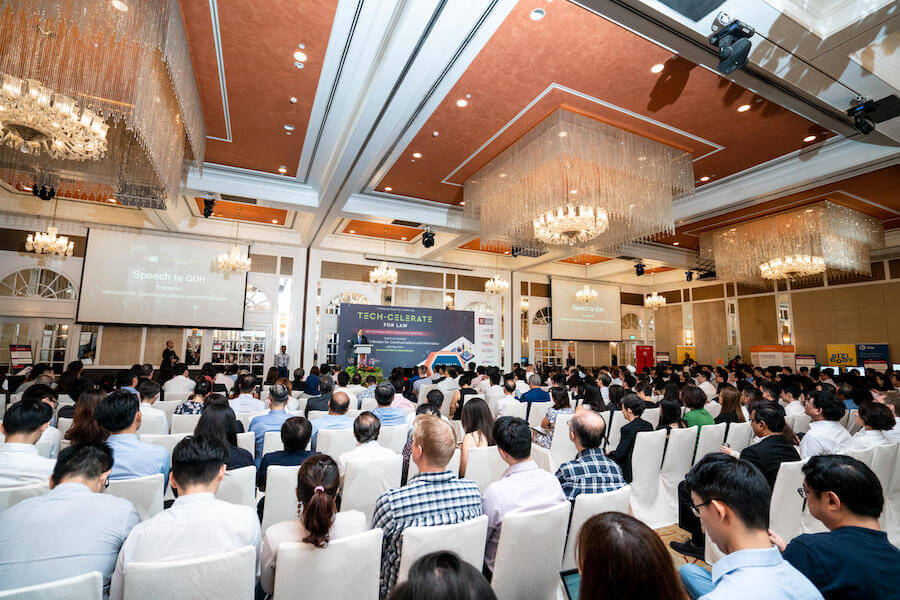
Over 300 participants attended the launch held at InterContinental Hotel
The Tech-celerate for Law conference also marked the launch of the SmartLaw Guild, a platform for forward-looking lawyers who are open to the challenge of re-inventing themselves to be future-ready. Complimentary membership is available to Singapore law practices that are SmartLaw-certified or were successful applicants of the Law Society’s past and/or present technology support schemes. Member firms of the SmartLaw Guild enjoy privileges such as priority updates on the latest technology and business innovations, support for grant applications and technology adoption, and the opportunity to network with a community of like-minded professionals to share experiences, strategies and resources. More information on Tech-celerate for Law, SmartLaw Guild and other capability development initiatives for law firms can be found on the Law Society’s Legal Productivity and Innovation micro-site here.
The Tech-celerate for Law conference brought together consultants, legal professionals and non-legal professionals to discuss the challenges lying ahead for a workforce that will be increasingly affected by advances in computing, data analysis and artificial intelligence (to name a few areas). A key takeaway from the conference was that while technology was bound to alter the business landscape, companies stood to reap greater benefits from technology if they took the important first step of identifying problems that needed to be solved with technology before implementing solutions.
For those who were unable to attend the event, we have provided a video of the conference highlights within this article and a summary of the conference below.
The conference began with an opening speech by the President of the Law Society, Mr Gregory Vijayendran, SC (full text available here). In his call to arms to fellow lawyers to embrace technology, Mr Vijayendran cited testimonials from practitioners who had reaped benefits from adopting legal-tech solutions, but cautioned that many practitioners were still ambivalent about or underestimating the game-changing implications of technology for legal practice. Programmes such as Tech-celerate for Law could assist law practices surmount problems such as identifying the right legal-tech to employ and the costs of adopting and maintaining legal-tech. However, lawyers needed to recognise the urgent need to change with the times, and find ways to integrate uniquely human “soft-skills” with artificial intelligence and other emerging technologies to bring added value to their services.
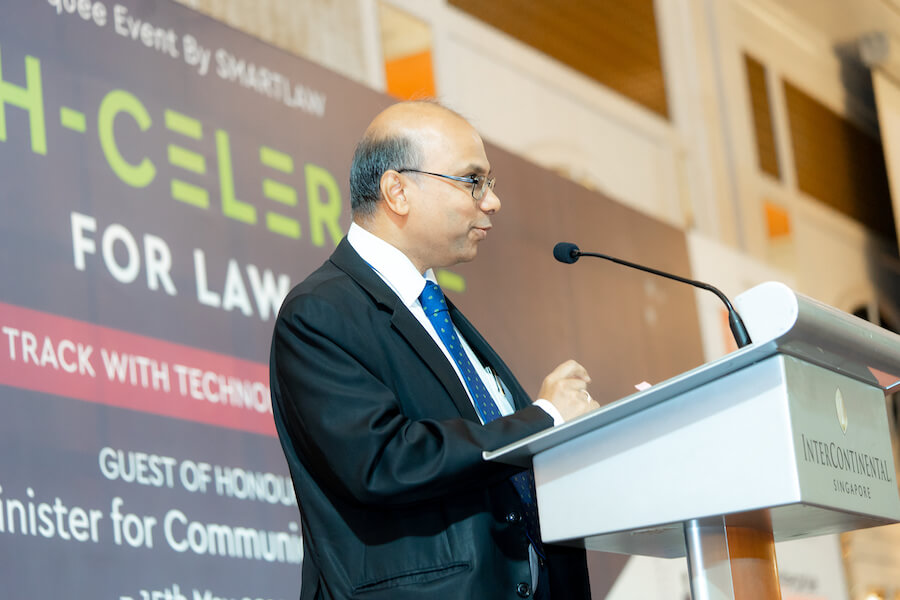
Opening speech by Mr Gregory Vijayendran SC
This was followed by a speech by the Guest of Honour and Minister for Communications and Information, Mr S. Iswaran. Continuing with the theme of the pervasiveness of technological disruption, Minister Iswaran described the technological changes taking place within the judiciary, Attorney-General’s Chambers and the Singapore Academy of Law. Practitioners would likewise need to increase their rate and depth of technology adoption and develop skills in areas such as artificial intelligence, cybersecurity and data analytics to be able to apply these areas in their practice. The Law Society plays an important role in this ongoing digital transformation, having successfully spearheaded technology adoption schemes and organised workshops to raise awareness among the profession on topics such as cybersecurity, legal-tech and legal-tech adoption strategies. Given the challenges lying ahead, Minister Iswaran urged practitioners to be proactive and embark on the necessary digitalisation journeys together, to learn from one another, and increase the competitiveness of Singapore’s legal sector.
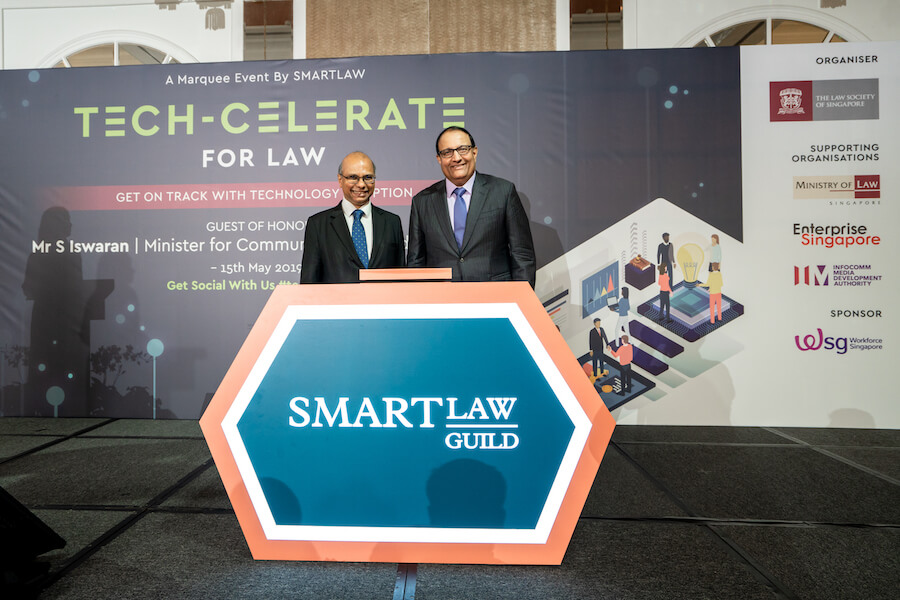
Launch of SmartLaw Guild by Minister for Communications and Information, Mr S. Iswaran (right)
Ms Nicole Scoble-Williams, Director of Deloitte’s Future of Work Centre of Excellence, then took the stage for the first keynote speech, titled the “Future of the Legal Workforce”. If numerous jobs today are vulnerable to automation, what would the future of work be like? Ms Scoble-Williams shared her insights into the “augmented workforce” of the future, which would see traditional full-time employees working extensively alongside “off-balance sheet” independent contractors and machines to deliver solutions more quickly than ever. In this future workplace, adaptability and lifelong learning would be crucial to success. For lawyers, this could mean adopting a more entrepreneurial and relationship-centric mind-set to lawyering. Readers can look forward to further details on this topic in the July issue of the Singapore Law Gazette.

Ms Nicole Scoble-Williams, Director of Deloitte’s Future of Work Centre of Excellence
The presentation was followed by a panel led by the Law Society’s CEO, Mrs Delphine Loo Tan, titled “Sharing on Experiences with SmartLaw Firms – The SmartLaw Journey”. Ms Wang Yingyu of Taylor Vinters Via, Mr Shawn Chan of Altum Law Corporation, and Mr Ramesh Bharani of RBN Chambers LLC gave their accounts of the good and bad of their firms’ legal-tech adoption journeys and fielded questions from an audience that was curious to learn more, details of which may be found here. The final take-away was this: adopting technology requires effort and patience, but the adoption journey need not be a lonely and costly one with the Tech-celerate for Law programme.
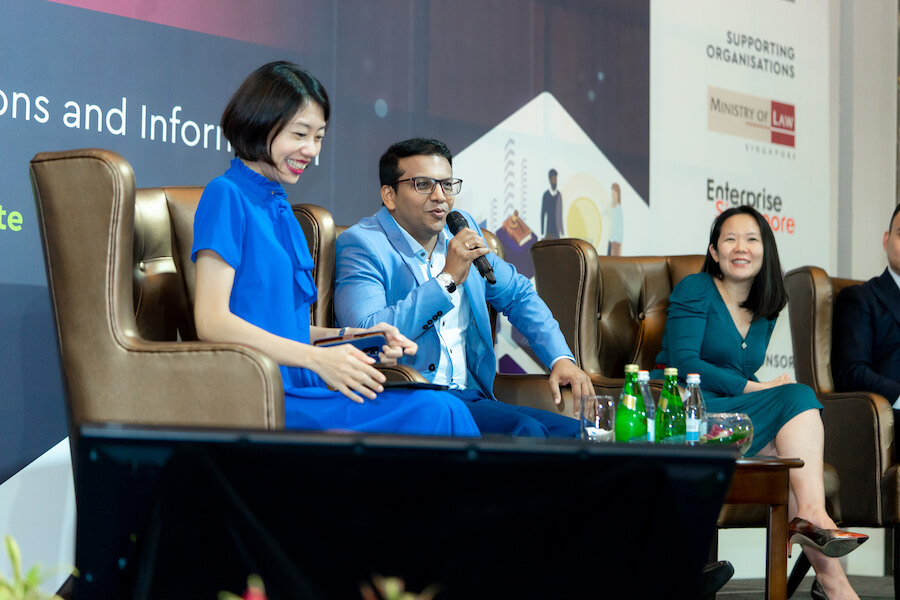
Panel Discussion on “Sharing on Experiences with SmartLaw Firms – The SmartLaw Journey“
Following the lunch-break Mr Eric Chin, a Principal of Alpha Creates (a Melbourne-based legal-tech consultancy), delivered his keynote speech titled “LegalTech Strategies for Law Firms”. Mr Chin noted that the Singapore legal-tech scene was developing with the mushrooming of legal-tech companies and the expansion of law firms into the legal-tech space. Mr Chin suggested that in response, lawyers could do any of the following to acquire legal-tech capabilities: build (by hiring the appropriate staff), borrow (by being a consumer of legal-tech solutions), or buy (by taking over legal-tech companies). Further insights from Mr Chin on legal-tech will be revealed in the July issue of the Singapore Law Gazette.

Mr Eric Chin, Principal of Alpha Creates
The conference ended with a panel titled “Sharing on Experiences from Innovation Leaders from Other Industries” moderated by Mr Paul Seah, a Senior Partner at Tan Kok Quan Partnership. This panel drew out anecdotes from three non-legal professionals, Ms Vivien Jong (Asia Chief Digital Officer, BNP Paribas Wealth Management), Mr Elvin Too (Vice-President (Transformation, Consumer Singapore), Singtel) and Mr Owen Hawkes (Partner (Forensic Dispute Advisory), KPMG), who shared their experiences navigating technological change within their respective industries.
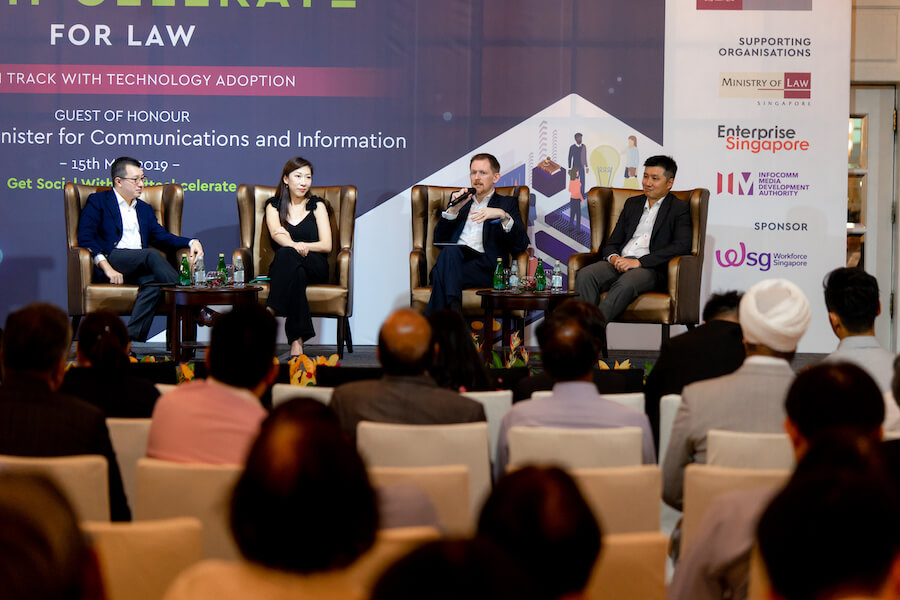
Panel discussion on “Sharing on Experiences from Innovation Leaders from Other Industries“
Again, it was clear from the discussion that disruption and evolving client needs were catalysts for reflection and action to improve existing processes within these organisations. Mr Too detailed how, in response to a customer base that was increasingly internet-savvy and reluctant to visit physical post-offices, Singpost rolled out a 24-hour automated self-service registered mail facility. Ms Jong shared how technology had created many opportunities for rethinking BNP’s internal processes and had made information available to sophisticated clients more quickly than ever, creating challenges in servicing such clients. Similarly, Mr Hawkes explained how outsourcing and computing power posed a real threat to the “ticking and bashing” accountants whose work involves routine checking, and even those whose jobs required decision-making using large amounts of data. However, while those jobs could be automated, jobs would also be created as technology created new areas for people to engage with.
After a day filled with stimulating conversations on what technology holds for the future of the legal profession, it was clear that interpersonal skills, a willingness to re-examine the status quo, and adaptability are all essential skills for the legal practitioner of tomorrow — who, it must be added, may not even be lawyers as we know them today! From all of us at the Law Society, we hope this conversation on law and technology will be a continuing and evolving one.





